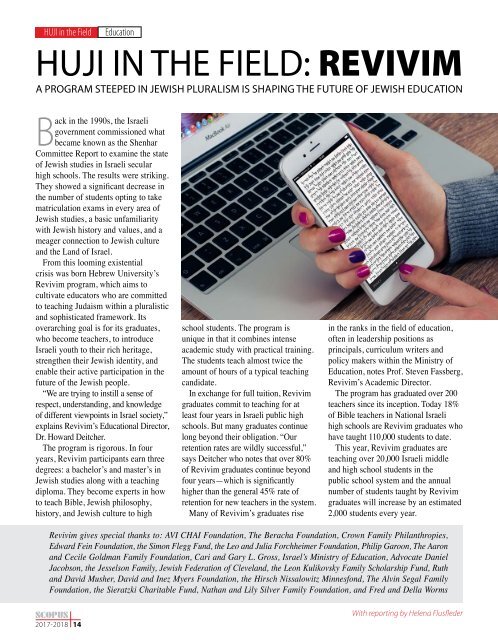Create successful ePaper yourself
Turn your PDF publications into a flip-book with our unique Google optimized e-Paper software.
BRAVE NEW WORLD<br />
CYBERSECURITY IS FRONT AND CENTER IN THE<br />
RACE TO PROTECT DIGITAL INFORMATION<br />
With our trusted safety methods of old—a locked filing cabinet with important papers—long<br />
gone in the age of digital information, crucial sectors in our society such as banking, healthcare,<br />
and government services, are almost wholly dependent on open networks like the Internet.<br />
Keeping their information safe is a chief and pressing challenge for cybersecurity experts.<br />
For two decades, cybersecurity experts have warned that the only way to fully protect online<br />
information is to change the basic, underlying protocols that are the backbone of the Internet,<br />
governing how messages are sent and how computers communicate with each other, explains<br />
Prof. Danny Dolev, the Hebrew University Berthold Badler Professor of Computer Science.<br />
Developed in the 1980s, these protocols were designed long before their designers could have<br />
predicted how the Internet would advance or how it could be used as a weapon against us. As<br />
such, they were designed primarily to provide connectivity between users and not to ensure that<br />
the information sent across the Internet is secure against malicious behavior.<br />
New protocols have been proposed, but replacing the entire infrastructure now would “be<br />
impossible,” says Dolev. It would require changing every connected device, server and router.<br />
Dolev, who heads the HUJI Cybersecurity Research Center jointly with Professor Michael<br />
Schapira, also a researcher in the Center, has developed industry-changing technologies for<br />
securing Internet protocols. These novel solutions to an age-old problem circumvent the obstacles<br />
to adoption facing past proposals as they do not involve replacing today’s infrastructure and<br />
are remarkably effective even in very partial adoption, explains Dolev. He and Schapira are<br />
currently working with the Israeli National Cyber Bureau on examining the manner in which<br />
these technologies can protect Israel from cyberattacks.<br />
Other researchers at the HUJI Cybersecurity Research Center are working on repelling other<br />
modes of dangerous cyberattacks. Dr. Aviv Zohar, for example, is working on solutions to<br />
attacks in which hackers lock personal computers and demand ransom to unlock them. Dr.<br />
Matan Gavish is focusing on protecting critical national infrastructures, such as nuclear reactors<br />
and power grids.<br />
Many of these efforts are part of the Fraunhofer Project Center for Cybersecurity at the Hebrew<br />
University, which is a joint effort of the University and the Fraunhofer Institute for Secure<br />
Information Technology (SIT), the leading institute for applied cybersecurity research in<br />
Germany. This center is well on track to become a leading institution for applied cybersecurity<br />
research worldwide.<br />
<strong>2017</strong>-2018 8

















